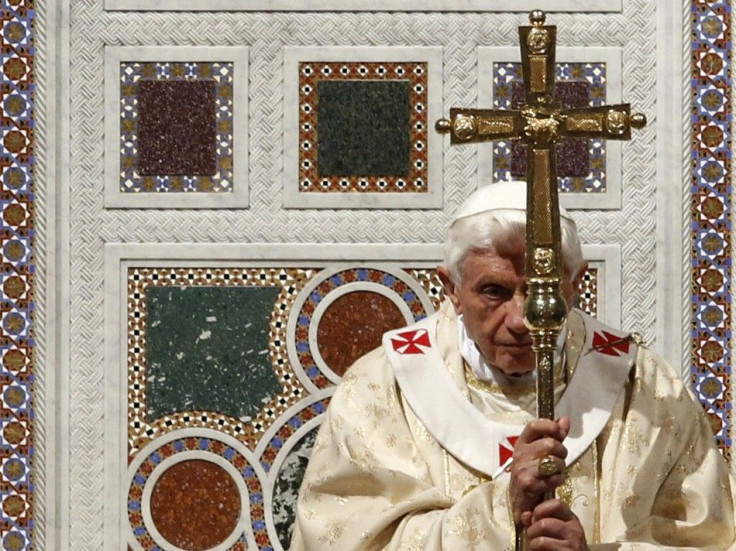Pope Benedict XVI Resignation Statement: A Model Of Clarity, In Latin [FULL TEXT]

The announcement that Pope Benedict XVI was resigning his position was shocking for many reasons. Not just because it was the first time since 1415 that the head of the Catholic Church stepped down, but also because it was made in a language that doesn’t appear often on the world stage -- not, at least, since the Middle Ages. Pope Benedict did not announce his resignation in Italian, the everyday language of the Vatican, he did not speak in his native German, nor did he use English, the language of international diplomacy. He delivered the most surprising news of the year, possibly of the decade, in Latin.
“Declaro me ministerio Episcopi Romae, Successoris Sancti Petri ... renuntiare” (“I declare that I renounce the office of Bishop of Rome, successor of Saint Peter”), the pope said, in the third paragraph of his short statement.
It took the head of the Catholic Church, one of the last absolute monarchs left on the Earth, just 251 terse Latin words to say he was stepping down, because he was feeling too old an infirm to properly serve in his office. Or, as he said in the opening paragraph, “Vires meas ingravescente aetate non iam aptas esse” (“My strength is no longer adequate, given my advancing age”).
As the full text of his statement below will prove to those who know even basic Latin, the pope’s words are an example of clarity and elegance. The Catholic Church may not be known as a public relations powerhouse, but the Holy See’s Latin remains a model of straightforward communication.
And it was a source of unlikely scoops, as well: The first news outlet to announce the resignation to the world was the Italian news agency ANSA, whose Vatican correspondent Giovanna Chirri was among the few journalists listening in on the pope’s words on closed-circuit TV (the Holy Father was, officially, announcing the canonization of three minor figures, not exactly worldwide news).
“Everybody spoke in Latin,” Chirri recounted to the Italian daily Il Messaggero. “And when the pope’s turn came, I realized immediately he was resigning. But my brain didn’t want to believe it. I was a bit terrified, honestly, and wasted some time. Then I called my office. Those were hectic moments.” It's familiar stuff for any reporter, with the added twist of Latin.
But how did Chirri know the language well enough?
In Italy, where high schools are differentiated by subjects taught and by number of years, the “liceo classico” and “liceo scientifico,” focusing respectively on classics and the humanities and on math and science, as the names indicate, force their students through five grueling years of Latin, including a dreaded final exam in which students are asked to translate tough, Roman-era literature from authors such as Cicero and Tacitus (the “classico” high school adds five years of ancient Greek, complete with reading tragedies and philosophy works in the original).
Most Italian journalists are, not too surprisingly, a product of the liceo classico. But not many get to use their Latin skills in the field, like Chirri did.
Below is the full text of Pope Benedict’s speech in Latin, as released by the Vatican.
Fratres carissimi,
Non solum propter tres canonizationes ad hoc Consistorium vos convocavi, sed etiam ut vobis decisionem magni momenti pro Ecclesiae vitae communicem. Conscientia mea iterum atque iterum coram Deo explorata ad cognitionem certam perveni vires meas ingravescente aetate non iam aptas esse ad munus Petrinum aeque administrandum. Bene conscius sum hoc munus secundum suam essentiam spiritualem non solum agendo et loquendo exsequi debere, sed non minus patiendo et orando. Attamen in mundo nostri temporis rapidis mutationibus subiecto et quaestionibus magni ponderis pro vita fidei perturbato ad navem Sancti Petri gubernandam et ad annuntiandum Evangelium etiam vigor quidam corporis et animae necessarius est, qui ultimis mensibus in me modo tali minuitur, ut incapacitatem meam ad ministerium mihi commissum bene administrandum agnoscere debeam. Quapropter bene conscius ponderis huius actus plena libertate declaro me ministerio Episcopi Romae, Successoris Sancti Petri, mihi per manus Cardinalium die 19 aprilis MMV commissum renuntiare ita ut a die 28 februarii MMXIII, hora 29, sedes Romae, sedes Sancti Petri vacet et Conclave ad eligendum novum Summum Pontificem ab his quibus competit convocandum esse.
Fratres carissimi, ex toto corde gratias ago vobis pro omni amore et labore, quo mecum pondus ministerii mei portastis et veniam peto pro omnibus defectibus meis. Nunc autem Sanctam Dei Ecclesiam curae Summi eius Pastoris, Domini nostri Iesu Christi confidimus sanctamque eius Matrem Mariam imploramus, ut patribus Cardinalibus in eligendo novo Summo Pontifice materna sua bonitate assistat. Quod ad me attinet etiam in futuro vita orationi dedicata Sanctae Ecclesiae Dei toto ex corde servire velim.
Ex Aedibus Vaticanis, die 10 mensis februarii MMXIII
© Copyright IBTimes 2024. All rights reserved.






















